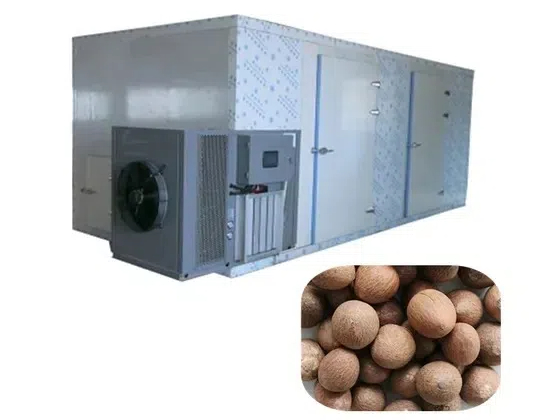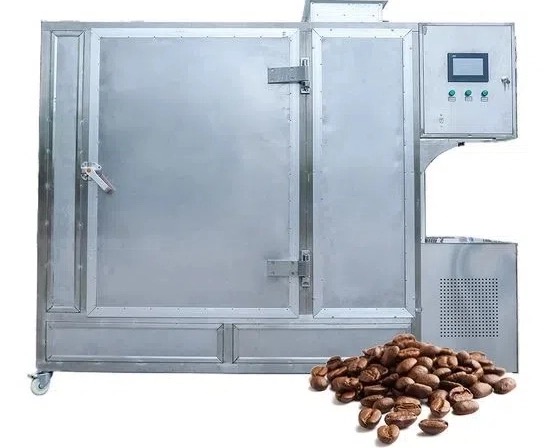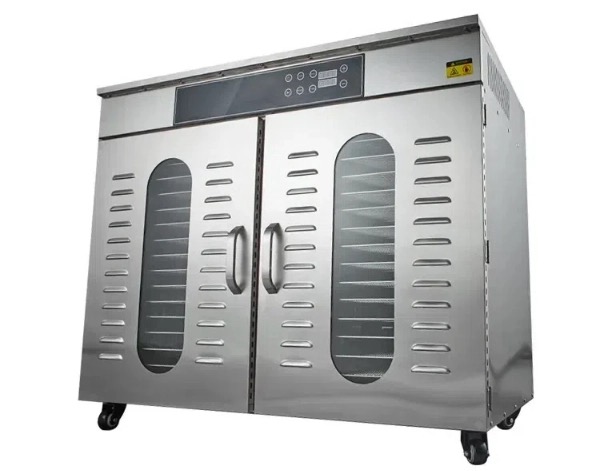
Content Menu
● Introduction to Room Type Drying Machines
>> Key Features of Room Type Drying Machines
● Benefits of Room Type Drying Machines
>> 1. Consistent and Uniform Drying
>> 2. Preservation of Nutritional Value and Flavor
>> 3. Extended Shelf Life
>> 4. Versatility and Customization
>> 5. Energy Efficiency and Environmental Benefits
● Cost Considerations
>> Cost Breakdown
● Comparison with Other Drying Methods
>> Freeze Drying
>> Solar Drying
>> Dehydrator Drying
● Case Studies and Applications
● Future Developments and Trends
● Conclusion
● FAQs
>> 1. What are the key benefits of using room type drying machines?
>> 2. How do room type drying machines compare to freeze drying in terms of cost and efficiency?
>> 3. What maintenance is required for room type drying machines?
>> 4. Can room type drying machines be customized for specific food products?
>> 5. How do room type drying machines contribute to environmental sustainability?
● Citations:
In the realm of food processing, room type drying machines have emerged as a crucial tool for preserving a wide variety of food products, including fruits, vegetables, meats, and grains. These machines offer a controlled environment that ensures consistent drying conditions, which is essential for maintaining the nutritional value and flavor of the food. This article will delve into the benefits and costs associated with room type drying machines, highlighting their versatility, energy efficiency, and customization options.

Introduction to Room Type Drying Machines
Room type drying machines are designed to provide a large-scale drying solution, accommodating substantial volumes of food products. They are particularly beneficial for industries that require high production capacities and consistent product quality. Unlike traditional drying methods, such as sun drying or oven drying, room type drying machines offer a controlled environment that prevents contamination and ensures uniform drying.
Key Features of Room Type Drying Machines
1. Adjustable Temperature Settings: These machines allow operators to adjust the temperature according to the specific requirements of different food products. For instance, fruits typically require lower temperatures (around 40°C to 50°C), while meats may need higher temperatures (up to 70°C) for safe drying.
2. Proper Air Circulation: Strategically placed vents or fans ensure uniform airflow across all trays or shelves, preventing hot spots and ensuring consistent drying results.
3. Capacity and Customization: Room type drying machines often come with multiple drying trays or shelves, allowing for the drying of large batches and different types of food simultaneously. Customizable tray heights and drying racks accommodate foods of varying sizes and thicknesses.
4. Energy Efficiency: Features like insulated drying chambers and low-power fans reduce electricity consumption, making these machines cost-effective and environmentally friendly.
5. Advanced Control Systems: Modern machines include touch screen interfaces, remote monitoring capabilities, and automated temperature and humidity controls, ensuring precise control over the drying process.
Benefits of Room Type Drying Machines
1. Consistent and Uniform Drying
Room type drying machines ensure consistent drying conditions, which is crucial for maintaining the quality and nutritional value of food products. This consistency also helps in reducing waste and increasing product value.
2. Preservation of Nutritional Value and Flavor
By controlling the drying environment, these machines help preserve the nutritional content and flavor of food. This is particularly important for products like fruits and vegetables, where vitamin retention is a key concern.
3. Extended Shelf Life
The removal of moisture from food products creates an environment inhospitable to microorganisms, significantly extending the shelf life of dried foods.
4. Versatility and Customization
Room type drying machines are highly versatile and can be customized to meet specific industry requirements. They can be used for a wide range of food products, from delicate herbs to dense meats.
5. Energy Efficiency and Environmental Benefits
These machines are designed with energy efficiency in mind, incorporating features like heat recovery systems and efficient air circulation mechanisms. This not only reduces operational costs but also contributes to a smaller environmental footprint.

Cost Considerations
While room type drying machines offer numerous benefits, their cost can be a significant factor for businesses. The initial investment in purchasing and installing these machines is higher compared to smaller-scale drying solutions. However, the long-term benefits, including reduced energy costs and increased production capacity, can offset these initial expenses.
Cost Breakdown
- Initial Investment: The cost of purchasing a room type drying machine can vary widely depending on the capacity and features. For large-scale operations, the cost can be substantial.
- Operating Costs: Despite the high initial cost, these machines are designed to be energy-efficient, which reduces operational costs over time.
- Maintenance Costs: Regular maintenance is necessary to ensure optimal performance. This includes cleaning the drying chamber, inspecting air filters, and calibrating temperature sensors.
Comparison with Other Drying Methods
Freeze Drying
Freeze drying is another method used for preserving food, but it involves a different process. Freeze dryers work by freezing the food and then reducing the surrounding pressure to allow the frozen water to sublimate (change directly from solid to gas) without going through the liquid phase. This method is excellent for preserving the nutritional content and texture of food but requires specialized equipment and can be more expensive to operate.
Solar Drying
Solar drying is a traditional method that relies on sunlight to dry food. While cost-effective, it is weather-dependent and can lead to inconsistent drying results. Solar dryers are less suitable for large-scale commercial operations due to these limitations.
Dehydrator Drying
Dehydrator drying is similar to room type drying but typically operates on a smaller scale. Dehydrators are ideal for home use or small businesses but lack the capacity and customization options of room type drying machines.
Case Studies and Applications
Room type drying machines have been successfully implemented in various industries:
- Fruit and Vegetable Processing: Companies use these machines to dry fruits like apricots, apples, and berries, as well as vegetables like carrots and sweet potatoes. The controlled environment ensures that the dried products retain their color and nutritional value.
- Meat and Poultry Industry: Room type drying machines are used for drying meats like beef jerky and chicken strips. The precise temperature control ensures that the meat is dried safely and evenly.
- Herbal and Spice Industry: These machines are also used for drying herbs and spices, preserving their aroma and flavor.
Future Developments and Trends
The future of room type drying machines looks promising, with ongoing advancements in technology aimed at improving efficiency and reducing environmental impact. Some emerging trends include:
- Integration with Renewable Energy Sources: There is a growing interest in integrating room type drying machines with renewable energy sources, such as solar or wind power, to further reduce operational costs and carbon footprint.
- Advanced Automation and Monitoring Systems: Modern machines are being equipped with advanced automation and monitoring systems that allow for real-time monitoring and adjustments, ensuring optimal drying conditions and minimizing energy waste.
Conclusion
Room type drying machines offer a comprehensive solution for food drying, providing consistent quality, energy efficiency, and versatility. While the initial investment may seem high, the long-term benefits in terms of reduced operational costs and increased product value make them a valuable asset for businesses in the food processing industry.

FAQs
1. What are the key benefits of using room type drying machines?
Room type drying machines offer consistent and uniform drying, preservation of nutritional value and flavor, extended shelf life, versatility, and energy efficiency. They are highly customizable and can be integrated with other food processing equipment.
2. How do room type drying machines compare to freeze drying in terms of cost and efficiency?
Room type drying machines are generally more cost-effective for large-scale operations due to their energy efficiency and ability to handle high volumes. Freeze drying, while excellent for preserving nutritional content, requires specialized equipment and can be more expensive to operate.
3. What maintenance is required for room type drying machines?
Regular maintenance includes cleaning the drying chamber, inspecting and replacing air filters, calibrating temperature and humidity sensors, and lubricating moving parts. Professional maintenance checks are recommended at regular intervals.
4. Can room type drying machines be customized for specific food products?
Yes, these machines can be customized to meet specific industry requirements. Adjustable tray heights and customizable drying racks allow for accommodating foods of varying sizes and thicknesses.
5. How do room type drying machines contribute to environmental sustainability?
Room type drying machines contribute to environmental sustainability by incorporating energy-efficient features such as insulated drying chambers, low-power fans, and heat recovery systems. These features reduce energy consumption and lower carbon footprints.
Citations:
[1] https://www.dryeratech.com/top-features-to-look-for-in-room-type-drying-machines.html
[2] https://www.dryeratech.com/benefits-of-room-type-drying-machines.html
[3] https://www.familycanning.com/freeze-drying/cost-analysis/pork-chops/
[4] https://www.alamy.com/stock-photo/food-dehydrator.html
[5] https://www.youtube.com/watch?v=tfnRU7SZbok
[6] https://www.youtube.com/watch?v=qtC36z0HleQ
[7] https://harvestright.com/faqs/
[8] https://www.ukjuicers.com/dehydrator-faqs-a603
[9] https://www.webstaurantstore.com/guide/741/food-dehydrators-buying-guide.html
[10] https://www.dryeratech.com/how-room-type-drying-machines-improve-product-quality.html
[11] https://www.bxdrymachine.com/faq
[12] https://www.hachettebookgroup.com/storey/buying-food-dehydrator/
[13] https://excaliburdehydrator.com/pages/faqs
[14] https://pleasanthillgrain.com/resources/dehydrators-buying-guide
[15] https://www.consumerreports.org/appliances/washer-and-dryer-sets/all-in-one-washer-dryer-combos-pros-and-cons-a9236336700/
[16] https://www.freezedryingsystems.in/cost-analysis-of-implementing-a-food-freeze-drying-system-in-a-manufacturing-facility.html
[17] https://www.offthemrkt.com/lifestyle/seven-key-features-to-look-for-in-an-industrial-food-dryer
[18] https://www.istockphoto.com/photos/food-dehydrator
[19] https://stock.adobe.com/search?k=dehydrator
[20] https://www.shutterstock.com/search/food-dehydrator
[21] https://www.istockphoto.com/photos/food-dryer
[22] https://www.aromaco.com/faq/food-dehydrators/
[23] https://www.allrecipes.com/article/how-to-use-a-food-dehydrator/
[24] https://www.maytag.com/blog/washers-and-dryers/buying-a-washer-and-dryer.html
[25] https://www.thepurposefulpantry.com/dehydrating-faq/
[26] https://backpackinglight.com/home-freeze-dryer-worth-money/
[27] https://www.youtube.com/watch?v=-PPFl7dTDdI
[28] https://www.youtube.com/watch?v=mtDzdYoyeR8
[29] https://www.youtube.com/watch?v=GEcaANDS_FA
[30] https://www.youtube.com/watch?v=l81gCTvoUjg
[31] https://www.youtube.com/watch?v=vao_KqCzLUE
[32] https://www.lowes.com/n/buying-guide/dryer-buying-guide
[33] https://www.frigidairearabia.com/buying-guides/clothes-dryer/
[34] https://ask.metafilter.com/382419/Washer-dryer-buying-for-dummies











